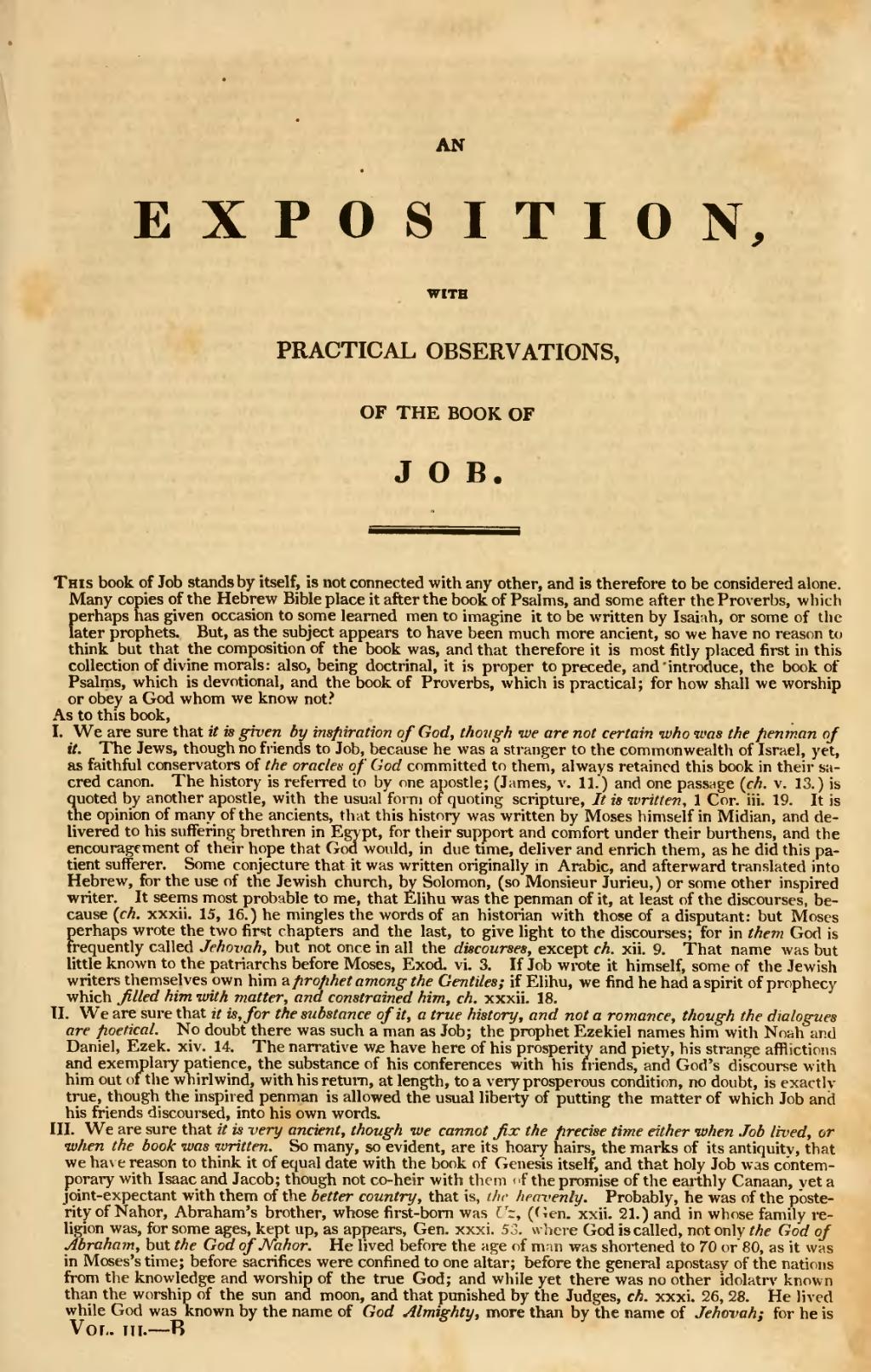AN
EXPOSITION,
WITH
PRACTICAL OBSERVATIONS,
OF THE BOOK OF
JOB.
This book of Job stands by itself, is not connected with any other, and is therefore to be considered alone. Many copies of the Hebrew Bible place it after the book of Psalms, and some after the Proverbs, which perhaps has given occasion to some learned men to imagine it to be written by Isaiah, or some of the later prophets. But, as the subject appears to have been much more ancient, so we have no reason to think but that the composition of the book was, and that therefore it is most fitly placed first in this collection of divine morals: also, being doctrinal, it is proper to precede, and introduce, the book of Psalms, which is devotional, and the book of Proverbs, which is practical; for how shall we worship or obey a God whom we know not?
As to this book,
I. We are sure that it is given by inspiration of God, though we are not certain who was the penman of it. The Jews, though no friends to Job, because he was a stranger to the commonwealth of Israel, yet, as faithful conservators of the oracles of God committed to them, always retained this book in their sacred canon. The history is referred to by one apostle; (James, v. 11.) and one passage (ch. v. 13.) is quoted by another apostle, with the usual form of quoting scripture. It is written, 1 Cor. iii. 19. It is the opinion of many of the ancients, that this history was written by Moses himself in Midian, and delivered to his suffering brethren in Egypt, for their support and comfort under their burthens, and the encouragement of their hope that God would, in due time, deliver and enrich them, as he did this patient sufferer. Some conjecture that it was written originally in Arabic, and afterward translated into Hebrew, for the use of the Jewish church, by Solomon, (so Monsieur Jurieu,) or some other inspired writer. It seems most probable to me, that Elihu was the penman of it, at least of the discourses, because (ch. xxxii. 15, 16.) he mingles the words of an historian with those of a disputant: but Moses perhaps wrote the two first chapters and the last, to give light to the discourses; for in them God is frequently called Jehovah, but not once in all the discourses, except ch. xii. 9. That name was but little known to the patriarchs before Moses, Exod. vi. 3. If Job wrote it himself, some of the Jewish writers themselves own him a prophet among the Gentiles; if Elihu, we find he had a spirit of prophecy which filled him with matter, and constrained him, ch. xxxii. 18.
II. We are sure that it is, for the substance of it, a true history, and not a romance, though the dialogues are poetical. No doubt there was such a man as Job; the prophet Ezekiel names him with Noah and Daniel, Ezek. xiv. 14. The narrative we have here of his prosperity and piety, his strange afflictions and exemplary patience, the substance of his conferences with his friends, and God's discourse with him out of the whirlwind, with his return, at length, to a very prosperous condition, no doubt, is exactly true, though the inspired penman is allowed the usual liberty of putting the matter of which Job and his friends discoursed, into his own words.
III. We are sure that it is very ancient, though we cannot fix the precise time either when Job lived, or when the book was written. So many, so evident, are its hoary hairs, the marks of its antiquity, that we have reason to think it of equal date with the book of Genesis itself, and that holy Job was contemporary with Isaac and Jacob; though not co-heir with them of the promise of the earthly Canaan, yet a joint-expectant with them of the better country, that is, the heavenly. Probably, he was of the posterity of Nahor, Abraham's brother, whose first-born was Uz, (Gen. xxii. 21.) and in whose family religion was, for some ages, kept up, as appears, Gen. xxxi. 53. where God is called, not only the God of Abraham, but the God of Nahor. He lived before the age of man was shortened to 70 of 80, as it was in Moses's time; before sacrifices were confined to one altar; before the general apostasy of the nations from the knowledge and worship of the true God; and while yet there was no other idolatry known than the worship of the sun and moon, and that punished by the Judges, ch. xxxi. 26, 28. He lived while God was known by the name of God Almighty, more than by the name of Jehovah; for he is
Vol. iii.—B

